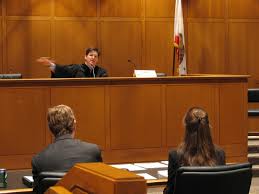California Bench Warrant – Penal Codes 166 and 978.5 PC
https://www.youtube.com/watch?v=3gg7aknShL0
A bench warrant (also known as a “body attachment”) is the most common type of warrant issued in California. A bench warrant refers to a warrant that is issued from the bench, meaning the judge. Bench warrants are issued pursuant to California Penal Code sections 166 and 978.5 (PC166; PC978.5).
A California Bench Warrant is Different than an Arrest Warrant
Unlike a California arrest warrant, a bench warrant is not issued based on suspected criminal activity. A bench warrant is most typically issued when you fail to do any of the following:
- Personally appear in court when required, for any reason; or
- Report for trial as a witness, defendant, or juror; or
- Pay a court ordered fine or restitution; or
- Pay a traffic citation; or
- Pay court ordered child support; or
- Pay court ordered spousal support; or
- Provide a parent of a child court ordered visitation; or
- Obey a court order to vacate property, as in an eviction, or
- Obey any other court order, or
- Obey any of the terms of your probation or post-release community supervision.
California Bench Warrant Issued Due to Failure to Appear in Court

Failure to Appear (“FTA”) warrants are the most commonly issued bench warrants and are issued by the judge when you fail to do any of the following:
- Personally appear in court when required, for any reason (e.g., arraignment, pre-trial hearing, sentencing hearing, etc.); or
- Attend progress report hearings pertaining to your probation; or
- Show proof of enrollment or completion of a court ordered program (e.g., DUI school, domestic violence classes, Prop 36, etc.), or
- Report for trial in which you are a necessary party (e.g., defendant, witness, juror, etc.);
A conviction for Failure to Appear in Court may result in Substantial Consequences:
- Failure to Appear-Written Promise (California Penal Code Section 853.7): Willful failure to appear in court after having been given a written promise to appear (“citation”) is a misdemeanor, punishable by up to one year in county jail and/or a maximum fine of $1,000 regardless of the disposition of your original charge(s).
- Failure to Appear in Misdemeanor Case (California Penal Code Section 1320(a)): If you have been released on your own recognizance (“O/R”) pending a misdemeanor case, willful failure to appear in court within 14 days of a scheduled court date is a misdemeanor for “evading the process of the court.” A conviction may result in imprisonment in county jail for up to one year and/or a maximum fine of $1,000.
- Failure to Appear in Felony Case (California Penal Code Section 1320(b)): If you have been released “O/R” pending a felony case, willful failure to appear in court within 14 days of a scheduled court date, is a felony. A conviction may result in imprisonment in county jail for up to 3 years and/or a maximum fine of $5,000. If you fail to appear in court involving a felony case for which you posted bail, the maximum fine will increase from $5,000 to $10,000. (California Penal Code Section 1320.5)
What this means is that if you “fail to appear” in any of the 3 situations outlined above you are facing a conviction and jail time even if you are able to prevail on the underlying charge for which you were originally arrested. This is why it is so critical you retain a criminal defense lawyer to represent you as soon as you realize that a failure to appear has been issued for your arrest.
Suspension of Your Driver License Due to Violation of Written Promise to Appear in Court
The DMV will suspend the driving privileges of any person who violates a written promise to appear in court until his/her driving record has been cleared of the violation (California Vehicle Code Section 13365).
California Bench Warrant Issued Due to Failure to Pay Fines or Restitution
A bench warrant may be issued if you willfully fail to pay court ordered fines or restitution on or before the date the court set for you to pay. Willful failure to pay a fine or restitution if you have means to do so is a misdemeanor and is punishable by up to one year in county jail (California Penal Code section 1203.04).
Civil Assessment
If you violate your written promise to go to court, do not pay your fine on time, or do not obey an order of the court, you may be charged with a “penalty assessment” up to $300.00, and your case may be referred for collection (California Penal Code section 1214.1).
Additionally, the court may impound (that is, suspend or restrict) your driver license for 30 days if you willfully fail to pay, on time, any fine or portion thereof due to a conviction for an infraction (California Vehicle Code section 40508(d)).
Bench Warrant Issued Due to Contempt of Court in a Civil Case

Contempt of court means willful failure to obey a court order. When the court issues a bench warrant in a case where you are not suspected of criminal activity (“civil case”), typically it is because you failed to do any of the following:
- Pay court ordered child support; or
- Pay court ordered spousal support; or
- Provide a parent of a child court ordered visitation; or
- Vacate property, such as in an eviction, or
- Obey any other order of the court
Bench Warrant Issued Due to Probation Violation in California
A bench warrant may be issued for failing to obey any court order, especially when you are on probation for a prior criminal offense. If you fail to comply with any term of your probation, you may be arrested by your probation officer if you are on formal (“felony”) probation, or the court can issue a bench warrant for your arrest.
Under California Penal Code Section 1203.2 (PC1203.2), a judge has the discretion to order the arrest of any probationer, whether under the supervision of a probation officer or not, for any alleged violation of probation.
Examples of probation terms include:
- Court ordered programs (e.g., DUI school, Prop 36, domestic violence classes, etc.)
- Community service
- Mandatory alcohol and/or drug testing
You may have to serve some jail time if you are found guilty of violating probation. However, there are many other consequences you could face. Be sure to visit our section on Probation Violation for more information.
What is contempt of court in California?
Doing any of the above is considered contempt of court. Contempt of court means willful failure to obey a court order. Once a bench warrant is issued, law enforcement has the authority to immediately arrest you. Contempt of court is a misdemeanor offense that may result in one or more of the following:
- A county jail sentence of up to one year
- A fine of up to $10,000
- Forfeiture of your bail, if you are out on bail
- A suspension of your California driver license
- A violation of your probation or post-release community supervision
Furthermore, if you violate a court ordered protective order (or “stay away order”) more than once within 7 years, in some instances you may be charged with a felony, punishable by up to 3 years in county jail (PC 166(c)(4)).
Additionally, you may have to serve some jail time if you are found guilty of violating probation. However, there are many other consequences you could face. Be sure to visit our section on Probation Violation for more information.
A judge can also issue a bench warrant if you are indicted by a California grand jury. If this is the case, and you are not in custody when the indictment is received, the judge will issue a bench warrant for your arrest.
Why should you hire a lawyer if you have a bench warrant out for your arrest?

If you have a bench warrant out for your arrest, it is important that you contact a criminal defense attorney at Wallin & Klarich right now. You can be taken into custody if you turn yourself in to the court. Our attorneys may be able to have your bench warrant recalled and quashed without you ever having to appear in court or spend any time in jail. With offices in Orange County, Los Angeles, San Diego, Riverside, San Bernardino, Ventura, West Covina and Victorville, the California criminal defense attorneys at Wallin & Klarich have successfully represented clients for over 40 years. We have the knowledge and experience to help you resolve your outstanding warrant.
Call (877) 466-5245 today for a free consultation. We will get through this together.

